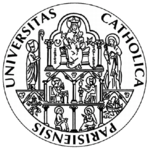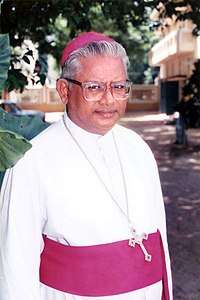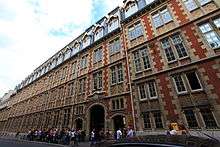Institut Catholique de Paris
 | |
| Latin: Universitas Catholica Parisiensis | |
| Type | Private |
|---|---|
| Established | c. 1875 |
| Founder | Mgr Maurice d'Hulst |
| Affiliation | Catholic Church |
| Chancellor | Cardinal André Vingt-Trois |
Academic staff | 750 (university only)[1] |
| Students | 15,500 within university and 8,500 in affiliated schools[1] |
| Location |
Paris, France 48°50′53″N 2°19′47″E / 48.84806°N 2.32972°ECoordinates: 48°50′53″N 2°19′47″E / 48.84806°N 2.32972°E |
| Affiliations | Catholic University |
| Website | www.icp.fr |
The Institut Catholique de Paris (ICP), known in English as the Catholic University of Paris (and in Latin as Universitas catholica Parisiensis), is a private university located in Paris, France. The institute was founded in 1875, under the name Université Catholique de Paris, by Maurice Le Sage d'Hauteroche d'Hulst.
Overview
The university offers licentiate, master and doctoral degrees in various faculties. The Faculté de Théologie is a pontifical institution with the canonical authorization to educate men for the Catholic priesthood. The Faculté de Lettres is a school of the humanities with no explicit religious orientation. During the summer, the Institut opens the Faculté de Lettres to international students month-long terms.
Professors at the university are recruited from sacred (i.e., theology, canon law, etc.) and secular disciplines (e.g., letters, philosophy, education, social sciences, economics). The majority of degrees and diplomas awarded by the Catholic University of Paris are state-authorised diplomas, as the university is certified to issue them by the Ministry of Education. Canonical degrees are awarded in the name of the Holy See and are the result of a prescribed course of study in the ecclesiastical faculties, such as theology and canon law.
The university charges tuition, because the state does not pay the wages of teachers at Catholic institutions of higher learning, as authorized under the Debré Law of 1959. The institute receives a state subsidy which covers 34% of its financial needs. The amount of subsidy, derived from the Ministry for National Education, is independently fixed each year by the government each year within the framework of the national budget and without obligation or contract of any kind.[2]
The Musée Edouard Branly, located within the institute, preserves the laboratory of physics professor and noted radio pioneer Édouard Branly, developer of the first practical radio receiver device, the Branly coherer, who also coined the term "radio".[3]
The university belongs to the network of the UDESCA (Union of the Catholic Higher Educational Establishments) which includes the five French Catholic institutes - Paris, Lille, Lyon, Angers and Toulouse - and associates with the International Federation of Catholic Universities (FIUC), comprising 200 Catholic universities throughout the world.
Notable alumni

- Pierre Pflimlin, MRP, president of the Council (1958), president of the European Parliament (1984-1987), minister of state (1958-1959, 1962)
- Jean-Marie Lustiger, cardinal
- André Vingt-Trois, cardinal, Archbishop Emeritus of Paris, France
- Archbishop Michael Augustine+, Archbishop Emeritus of Pondicherry and Cuddalore.
- Robert Barron, Auxiliary Bishop of Los Angeles, Evangelical Catholic media personality
- George Alencherry, cardinal, Major Archbishop of Ernakulam-Angamaly, India
- Alfred Baudrillart, cardinal
- Christoph Schönborn, cardinal
- Audrey Tautou, actress
- The Reverend Father D. S. Amalorpavadass
- Jean Vanier
- Matthew Fox
- Franc Rode, cardinal
- Anton Stres, Archbishop of Ljubljana, Slovenia
- Ruchira Kamboj, Indian diplomat[4]
Faculties

- Theologium, Faculty of Theology; (before 2009 Faculty of Theology and Religious Studies) is considered a hub for French and International theology with roots dating back to 1889. The academic training meets the academic standard of the Holy See.[5]
- Faculty of Philosophy; was founded in 1895.
- Faculty of Canon Law; it aims to promote and deepen the study of Canon Law and related sciences, and to provide students, clerics or laypersons with in-depth training in these subjects.
- Faculty of Humanities; since 1875 it offers academic training within its 4 departments and offer training for competitive examination (classe préparatoire or prépa in French)
- Literature Department
- History Department
- Languages Department
- History of Arts Department
- Faculty of Social Sciences and Economics; offers state recognized Bachelor's degrees in social and economic sciences as well in law and political sciences.
- Faculty of Education; offers since 1993 Bachelor, Master and PhD in Educational Sciences.
Schools
- École supérieure des sciences économiques et commerciales (ESSEC) is one of the foremost business schools and Grandes écoles in France.
- Institut supérieur d'électronique de Paris (ISEP) is a Grande école located in Paris. It specializes in electronics, telecommunication and computer science.
- École Supérieure de Chimie Organique et Minérale (ESCOM) is a Grande école located in Cergy. It specializes in chemical engineering.
- École d'électricité, de Production et des Méthodes Industrielles (EPMI)
- Institut Polytechnique LaSalle Beauvais
- Ecole de Psychologues Praticiens (EPP – Psycho-Prat)
- Ecole de Bibliothécaires-Documentalistes (EBD) is a librarian school.
- Institut Supérieur d'Interprétation et de Traduction (ISIT)
Libraries
The main library, known as Bibliothèque de Fels, is home to 600,000 volumes including 60,000 ancient volumes and 800 manuscripts. The library is mostly due to donation by Edmonds de Fel. Other libraries include Library Jean-de-Vernon of Theology and Biblical Sciences, Library of the Faculty of Canon Law which publish L'Année Canonique (The Canon Year) and the Library of Byzantium Studies.
References
- 1 2 "Catholic University of Paris at a Glance". Catholic University of Paris. Retrieved 30 May 2011.
- ↑ https://www.senat.fr/questions/base/2011/qSEQ110518434.html Question écrite n° 18434 de Mme Marie-Agnès Labarre à Mme la ministre de l'enseignement supérieur et de la recherche, Senat de France, retrieved on March 30, 2017
- ↑ Edouard Branly, the Coherer, and the Branly effect - History of Communications, Jean-Marie Dilhac, Communications Magazine, IEEE, Volume: 47 Issue: 9, September 2009, (quoting J. Terrat-Branly, Mon père, Edouard Branly, Corrêa, 1941) accessed 10 May 2011
- ↑ https://web.archive.org/web/20180719082451/http://www.hcisouthafrica.in/hc.php?id=High%20Commissioner
- ↑ "Theologium". Catholic University of Paris. Retrieved 30 May 2011.